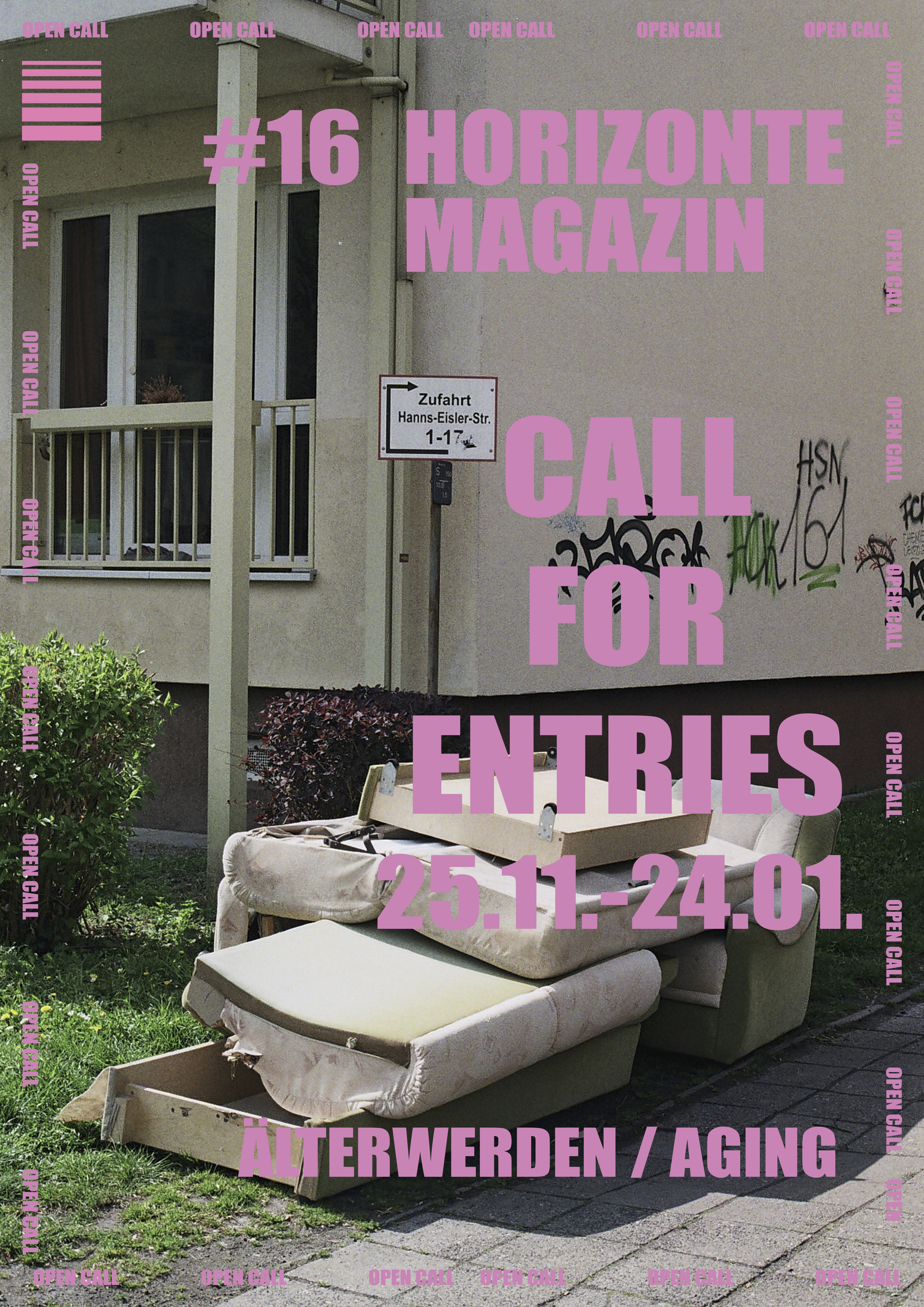16
Älterwerden / Aging
hier bewerben / send motivation here
In der nunmehr sechzehnten Ausgabe des horizonte Magazins für Architekturdiskurs soll sich alles um das Thema des Älterwerden drehen. Dabei begreifen wir das Altern nicht nur als physische Kondition, sondern auch als kulturelle Praxis und verstehen den Begriff prozesshaft, der alles von der Genese bis zum Verfall umfasst.
In westlichen Kulturkreisen wird das Altern seit jeher negativ, und zwar mit dem Verfall assoziiert. Er steht für den Verlust an Vitalität, Jugendlichkeit und “Schönheit.” Entsprechend dieser Überzeugungen etablierte sich ein Konservierungskult, unter deren Zwang mittlerweile jeder Körper steht – egal ob menschlich oder artifiziell. Welche Bedeutung hat das ständig Neue? Was erhoffen wir uns vom Neuen oder vom Festhalten an Traditionen? Haben Moden Platz zu bleiben oder kommen und gehen sie nur?
In einer dem ständigen ökonomischen Wachstumsdruck ausgesetzten Gesellschaft sind die Möglichkeiten für Langlebigkeit und Beständigkeit limitiert. Dabei könnte gerade im Hinblick auf den Klimawandel die Bewahrung des Vorhandenen auch eine Chance darstellen.
Was bedeutet das für den Bausektor? Wie kann der Umgang mit Bestand möglichst nachhaltig gestaltet werden? Welche Rolle spielt das Vorhandene/der Bestand in der Architektur? Ist es vorstellbar, den gesamten Lebenszyklus eines Gebäudes in den Planungsprozess mit einfließen zu lassen?
Die Geschwindigkeit, mit der sich die Welt entwickelt, macht die Erfahrungen, die eine Generation an die nächste weitergeben könnte, für diese scheinbar schon wieder obsolet. Ältere Menschen rücken kontinuierlich an den Rand der Gesellschaft.
Öffentlicher Konsumraum folgt der ökonomischen Notwendigkeit des Neuen und steigende Mietpreise in belebten, meist “jungen” Stadtteilen lassen sich mit prekären Renteneinnahmen nicht bezahlen.
Wir altern in Räumen, in Gebäuden, in Freiräumen, in Dörfern und in Städten. Was bedeutet überhaupt das “Älterwerden” in Städten? Welche Rolle kann “Stadt” im Alter haben? Und, altern Städte oder bleiben sie immer jung?
Egal ob Essay, Kommentar, oder literarisches Werk, Fotostrecke, Projekt oder künstlerische Arbeit – schick uns einfach ein Abstract oder Vorschau eurer Ideen bis zum 24.01.2023 per Mail.
______________
In the sixteenth issue of the horizonte magazine for architectural discourse, everything will revolve around the theme of aging. We understand aging not only as a physical condition, but also as a cultural practice encompassing everything from genesis to decay. The german word Älterwerden thereby puts emphasis on the processual connotation of the term.
In Western cultur, aging has always been associated negatively, with decay. It stands for the loss of vitality, youthfulness and "beauty." In accordance with these convictions, a cult of preservation has been established, under whose compulsion every body now stands - whether human or artificial. What is the significance of the constantly new? What do we hope for from the new or from holding on to traditions? Do fashions have a place to stay or do they just come and go?
In a society exposed to constant economic growth pressure, the possibilities for longevity and permanence are limited. Yet, especially in view of climate change, preserving what is already there could also represent an opportunity.
What does this mean for the building sector? How can the use of existing buildings be made as sustainable as possible? What role does the existing play in architecture? Is it conceivable to include the entire life cycle of a building in the planning process?
The speed at which the world evolves seems to make the experiences that one generation could pass on to the next already obsolete. Older people are steadily moving to the margins of society.
Public consumption space follows the economic necessity of the new, and rising rents in busy, mostly "young" neighborhoods cannot be paid for with precarious retirement incomes.
We age in spaces, in buildings, in open spaces, in villages and in cities. What does "growing older" in cities actually mean? What role can "city" play for the elderly? And do cities age or do they always stay young?
Whether it's an essay, commentary or literary piece, photo series, project or artistic work – just send us an abstract or preview of your idea by 24.01.2023 to our mail.
In der nunmehr sechzehnten Ausgabe des horizonte Magazins für Architekturdiskurs soll sich alles um das Thema des Älterwerden drehen. Dabei begreifen wir das Altern nicht nur als physische Kondition, sondern auch als kulturelle Praxis und verstehen den Begriff prozesshaft, der alles von der Genese bis zum Verfall umfasst.
In westlichen Kulturkreisen wird das Altern seit jeher negativ, und zwar mit dem Verfall assoziiert. Er steht für den Verlust an Vitalität, Jugendlichkeit und “Schönheit.” Entsprechend dieser Überzeugungen etablierte sich ein Konservierungskult, unter deren Zwang mittlerweile jeder Körper steht – egal ob menschlich oder artifiziell. Welche Bedeutung hat das ständig Neue? Was erhoffen wir uns vom Neuen oder vom Festhalten an Traditionen? Haben Moden Platz zu bleiben oder kommen und gehen sie nur?
In einer dem ständigen ökonomischen Wachstumsdruck ausgesetzten Gesellschaft sind die Möglichkeiten für Langlebigkeit und Beständigkeit limitiert. Dabei könnte gerade im Hinblick auf den Klimawandel die Bewahrung des Vorhandenen auch eine Chance darstellen.
Was bedeutet das für den Bausektor? Wie kann der Umgang mit Bestand möglichst nachhaltig gestaltet werden? Welche Rolle spielt das Vorhandene/der Bestand in der Architektur? Ist es vorstellbar, den gesamten Lebenszyklus eines Gebäudes in den Planungsprozess mit einfließen zu lassen?
Die Geschwindigkeit, mit der sich die Welt entwickelt, macht die Erfahrungen, die eine Generation an die nächste weitergeben könnte, für diese scheinbar schon wieder obsolet. Ältere Menschen rücken kontinuierlich an den Rand der Gesellschaft.
Öffentlicher Konsumraum folgt der ökonomischen Notwendigkeit des Neuen und steigende Mietpreise in belebten, meist “jungen” Stadtteilen lassen sich mit prekären Renteneinnahmen nicht bezahlen.
Wir altern in Räumen, in Gebäuden, in Freiräumen, in Dörfern und in Städten. Was bedeutet überhaupt das “Älterwerden” in Städten? Welche Rolle kann “Stadt” im Alter haben? Und, altern Städte oder bleiben sie immer jung?
Egal ob Essay, Kommentar, oder literarisches Werk, Fotostrecke, Projekt oder künstlerische Arbeit – schick uns einfach ein Abstract oder Vorschau eurer Ideen bis zum 24.01.2023 per Mail.
______________
In the sixteenth issue of the horizonte magazine for architectural discourse, everything will revolve around the theme of aging. We understand aging not only as a physical condition, but also as a cultural practice encompassing everything from genesis to decay. The german word Älterwerden thereby puts emphasis on the processual connotation of the term.
In Western cultur, aging has always been associated negatively, with decay. It stands for the loss of vitality, youthfulness and "beauty." In accordance with these convictions, a cult of preservation has been established, under whose compulsion every body now stands - whether human or artificial. What is the significance of the constantly new? What do we hope for from the new or from holding on to traditions? Do fashions have a place to stay or do they just come and go?
In a society exposed to constant economic growth pressure, the possibilities for longevity and permanence are limited. Yet, especially in view of climate change, preserving what is already there could also represent an opportunity.
What does this mean for the building sector? How can the use of existing buildings be made as sustainable as possible? What role does the existing play in architecture? Is it conceivable to include the entire life cycle of a building in the planning process?
The speed at which the world evolves seems to make the experiences that one generation could pass on to the next already obsolete. Older people are steadily moving to the margins of society.
Public consumption space follows the economic necessity of the new, and rising rents in busy, mostly "young" neighborhoods cannot be paid for with precarious retirement incomes.
We age in spaces, in buildings, in open spaces, in villages and in cities. What does "growing older" in cities actually mean? What role can "city" play for the elderly? And do cities age or do they always stay young?
Whether it's an essay, commentary or literary piece, photo series, project or artistic work – just send us an abstract or preview of your idea by 24.01.2023 to our mail.


